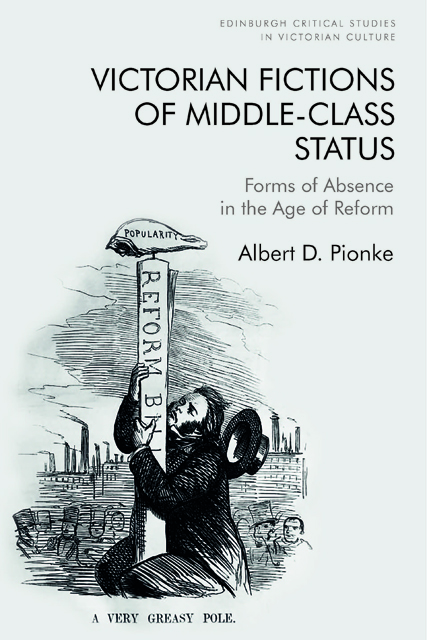Book contents
- Frontmatter
- Contents
- Acknowledgements
- Introduction: Victorian Middle-Class Status and the Negative Assertion of Value
- 1 The Orphan Narratives of a Class Lacking Antecedents
- 2 Repudiations of Wealth in Victorian Financial Fiction
- 3 The Violence at the Heart of the Social Problem Novel
- 4 Social Domination, Social Scientific Empiricism, and Novelistic Distrust of the Modern Fact
- 5 Legitimizing the Subjection of Middle-Class Women in Mid-Victorian Fiction
- Afterword
- Bibliography
- Index
2 - Repudiations of Wealth in Victorian Financial Fiction
Published online by Cambridge University Press: 25 April 2023
- Frontmatter
- Contents
- Acknowledgements
- Introduction: Victorian Middle-Class Status and the Negative Assertion of Value
- 1 The Orphan Narratives of a Class Lacking Antecedents
- 2 Repudiations of Wealth in Victorian Financial Fiction
- 3 The Violence at the Heart of the Social Problem Novel
- 4 Social Domination, Social Scientific Empiricism, and Novelistic Distrust of the Modern Fact
- 5 Legitimizing the Subjection of Middle-Class Women in Mid-Victorian Fiction
- Afterword
- Bibliography
- Index
Summary
If, instead of suddenly and unexpectedly dying, Michael Vanstone had survived long enough to have been swindled by the defrauding duo of Magdalen Vanstone and Horatio Wragge, then No Name might well have evolved into another recognizable subtype of the nineteenth-century novel: the novel of financial speculation. In this counterfactual fiction, the seduction of Noel Vanstone and the dissimulation before Admiral Bartram might have been replaced by a sequence of confidential after-hours consultations in the neighborhood of Threadneedle Street, where Wragge, posing as the agent of a broker-member of the Stock Exchange, would have puffed fallacious shares representing government consols, Exchequer Bills, an array of joint-stock companies, and foreign securities (including the highly suspect sovereign debt of Brazil, Chile, Colombia, Mexico, Peru, and Spain). Alternatively, Vanstone could have been seduced by the potential profits to be had on Lombard Street by setting up his own discount house for buying and selling bills of exchange, whose amounts might then have been altered or whose endorsers’ names discreetly forged as necessary to recoup the familial debt owed to Magdalen and Nora. Add to this hypothetical the untimely failure of one or more undercapitalized banks, an ephemeral overseas infrastructure scheme (mines and railways were particularly popular), and perhaps an opportunistically sunk and unfortunately underinsured merchant ship, and one would have a familiar set of narrative conventions representing the frightening array of lived possibilities for middle-class readers. Generally bereft, although perhaps not to the extent of the Vanstone sisters, of the benefits of gentle birth, these readers quite often did not possess what lawyers refer to as “real” property –land –but instead relied upon their own intellectual capital and individual credit. When these somewhat intangible sources of income succeeded in generating wealth, one had to do something with it –invest, speculate, or even gamble –in order to maintain one’s social position, and the need to do so exposed one to myriad risks in a largely unregulated financial system. A keen awareness of the fragility, even disingenuousness of middle-class status legitimated principally by wealth pervades Victorian fiction, which often cautions against over-reliance on the cash nexus by revisiting the crashes of the distant and recent past.
Writers and readers with especially long memories might have recalled the financial scandals of the previous century.
- Type
- Chapter
- Information
- Victorian Fictions of Middle-Class StatusForms of Absence in the Age of Reform, pp. 61 - 98Publisher: Edinburgh University PressPrint publication year: 2022



